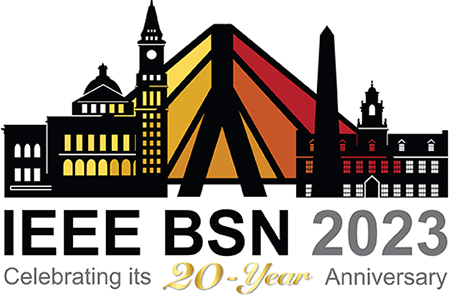Workshop 1: Workshop on Wearable Systems for Precision Metabolic Health
Workshop Location:
E14-674 (6th floor, main auditorium)
Workshop Overview
The workshop will focus on designing sensors, systems, and analytics to monitor a person’s metabolic health, detect events that are important for assessing metabolic health, and to design interventions for maintaining metabolic health and preventing chronic conditions arising from metabolic complications. The workshop will inform the audience about state-of-the-art research and future directions on end-to-end systems including sensor development, system deployment, data generation, and analytics to process and interpret findings. The workshop aims to cover the following topics:
- Measurement: this refers to search on developing sensors and tools for measuring behavioral, physiological, and biological determinants of metabolic health such as diet, physical activity, stress, and microbiome.
- Phenotyping: this refers to research on discovering and calculating biomarkers of metabolic health from multimodal wearable, environmental, and health data.
- Intervention: this topic refers to effective approaches that promote initiation and enhance maintenance of interventions that improve metabolic health, as well as new ways to design interventions, and how to identify optimal personalized interventions for precision health.
Workshop Schedule
2:45 – 3:00 | Introduction from Chairs
3:00 – 4:00 | Talks
- List of Speakers (Mini-Talks)
- Amir Rahmani (University of California Irvine): Exploring the Significance of Multimedia Food Logging and Personal Models in Food Computing
- Lauren Lederrer (Duke University): TBD
- Elena Idi and Francesco Prendin (Universita Degli Studi Di Padova): Detecting malfunctioning of CGM sensor and insulin pumps for safer T1D treatment
- Hassan Ghasemzadeh (Arizona State University): Counterfactual Explanations for Simulating Behavioral Treatments
- Bobak J Mortazavi (Texas A&M University): Multimodal Learning for Automated Nutrition Monitoring
4:00 – 4:15 | Break
4:15 – 5:15 | Panel on Digital Twin for Metabolic Health
- Moderator:
- Hassan Ghasemzadeh (Arizona State University)
- Panelists:
- Amir Rahmani (University of California Irvine): Topic: Digital twin (or personal model) augmented LLMs for personalized food recommendations
- Ali Roghanizad (Duke University): TBD
- Giacomo Cappon (Universita Degli Studi Di Padova): Digital twin methods and decision support systems in diabetes therapy
- Bobak J. Mortazavi (Texas A&M University): Automated and Personalized Nutrition Monitoring
5:15 – 5:30 | Closing Remarks
Workshop 2: NeuroWearX Workshop - Amplifying Digital Healthcare with Neurodesign in Wearable Robotics
For more information, please visit the workshop website: https://www.neurodesign-hri.ws/neurowearx
Workshop Location:
E14-393 (3rd floor) : Take the elevator to reach to 3rd floor. Turn left once you exit the elevator past the atrium towards the kitchen. E14-393 is right next to the kitchen.Workshop Overview:
Recent advancements in wearable robotics, including exoskeletons and prosthetics, offer transformative potential for rehabilitation and mobility assistance. However, the optimal benefit hinges on the devices’ ergonomic design, intuitiveness, and integration with human physiology and cognition—a domain where NeuroDesign plays an important role. NeuroDesign is an interdisciplinary approach that integrates neuroscience insights into the design of products, systems, or experiences to optimize human’s perception and interaction. Our workshop, “NeuroWearX: Amplifying Digital Healthcare with Neurodesign in Wearable Robotics,” explores the integration of NeuroDesign methodologies in wearable robotics to enhance digital healthcare. We will bring together domain experts to discuss critical aspects spanning the following spectrum:
- Personalized Treatment
- Improved Patient Experience
- Increased Accessibility and Affordability of the Devices
- Enhanced Rehabilitation
- Prevention and Early Intervention
Speakers:
- Sunil K Agrawal, Columbia University
- Hermano Igo Krebs, Massachusetts Institute of Technology
- Nitin Sharma, North Carolina State University
- Eric Leuthardt, Washington University in St. Louis
Organizing Committee:
- Ker-Jiun Wang, University of Pittsburgh
- Ramana Vinjamuri, University of Maryland, Baltimore County
- Zhi-Hong Mao, University of Pittsburgh
- Maryam Alimardani, Tilburg University
- Midori Sugaya, Shibaura Institute of Technology
Workshop 3: Human-centered Design for Digital Healthcare to Address Realworld Stakeholder Needs
Workshop Location:
E14-2-240 (2nd floor) : Take the elevator to reach to 2nd floor. Turn left once you exit the elevator and you will see room E14-240.
Workshop Overview
Addressing real-word needs for digital health care: current and future challenges of the “human centered” design
It is well known that mobile and web technologies and digital solutions are tools for strengthening health systems, providing new opportunities for coordination, decentralization, and expansion of care quality and equity. Focusing on the design process has some appeal because it acknowledges the potential for tech-enabled innovation without limiting effects to specific technologies or technical solutions. In this context, we emphasized that human-centered design is not only about creating technologies or addressing purely technical issues, but also about accompanying people and understanding the complex challenge of strengthening health systems in the digital age. And if all humanity could benefit from the human-centered approach? We will explore with our speakers current and future challenges of the “human centered” design in addressing the needs of the real-world stakeholders.
Organizers & Chairs
Federica Masci and Rossella Onofrio
Workshop Schedule
2:45 – 3:00 | Introduction to the Workshop theme (Federica Masci & Rossella Onofrio)
3:00 – 3:30 | Talk 1
“Wearables and Humanoid Robots for Health Monitoring, Prediction, and Prevention”
Daniele Pucci, Researcher,Head of Artificial and Mechanical Intelligence, Center for Robotics and Intelligent Systems, Istituto Italiano di Tecnologia, Italy3:30 – 4:00 | Talk 2
“A human-centered approach for a quantifiable and effective neuro-rehabilitation: the neurotype, phenotype, mechatype cycle”
Federico Tessari, Postdoctoral Associate Mechanical-Mechatronic Engineer, The Eric P. and Evelyn E. Newman Laboratory for Biomechanics and Human Rehabilitation, Department of Mechanical Engineering, Massachusetts Institute of Technology, USA4:00 – 4:15 | Break
4:15 – 4:45 | Talk 3
“Human health engineering: opportunities and challenges”
Jean Marie Aerts, Full Professor, Head of M3-BIORES, Chair of Biosystem Department, KU Leuven, Belgium4:45 – 5:15 | Talk 4
“Designing for Impact: Human-Centered Approaches to Enhance Digital Healthcare in Low-Resource Settings”
Gizeaddis Simegn, Associate Professor, Director of University-Industry Linkage and Technology Transfer, Team leader of AI & Biomedical Imaging Research Group School of Biomedical Engineering, Jimma University, Jimma, Ethiopia5:15 – 5:30 |Questions and Closing remarks (Federica Masci & Rossella Onofrio)


